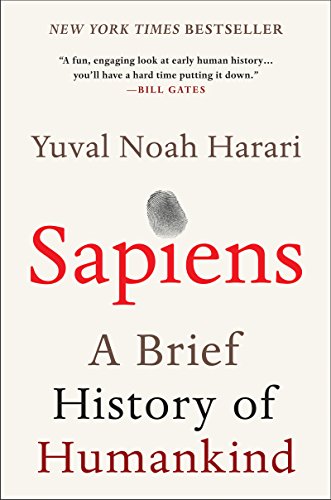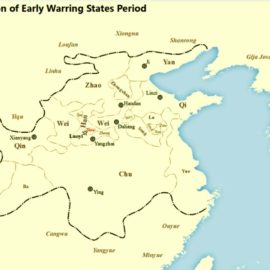

This article is an excerpt from the Shortform summary of "Sapiens: A Brief History of Humankind" by Yuval Noah Harari. Shortform has the world's best summaries of books you should be reading.
Like this article? Sign up for a free trial here .
What are the key aspects of empire history? What are the critiques of imperialism? What were the benefits?
In this succinct imperialism history, we’ll cover what it takes for a nation to become an empire and how imperialism shortened the distance between people of disparate cultures.
Empire History: What Is an Empire?
Money has brought the disparate worlds on Earth into one global community, but the market doesn’t always win. We can’t view human history solely through the lense of economy. While gold and silver had a huge impact in shaping our world, steel did as well.
The second unifier of humankind is empire. An empire is a political system that meets 2 requirements:
1. It rules over a large number of people living in distinct areas and of distinct cultural heritages. For example, the Roman Empire was comprised of diverse cultural communities in Europe, North Africa, and parts of Asia.
2. It can take in increasingly more territories without changing, in any fundamental way, the overall functioning, structure, and identity of the system. This distinction is a little subtler. Let’s compare Great Britain today and the British Empire of the past. Great Britain has definite borders. To extend or alter them would change Great Britain’s basic structure and identity. Great Britain isn’t an empire. In contrast, a century ago, the British Empire encompassed territories all over the world and still retained its British identity. The fact that it could maintain its identity while expanding made it an empire rather than a nation.
These two requirements have given empires the ability to unite diverse groups and territories under one government, and they’re crucial to understanding imperial history. This unification is also one of the reasons that the world today is much less diverse than it was before the rise of empires.
Empire History: Critiques of Empire
In modern times, “empire” and “imperialism” are bad words. They’re accused of destroying and exploiting local resources and ways of life. The establishment and maintenance of many of the most successful empires did involve destruction and violence, including war, enslavement, and genocide. But as we’ll see throughout this chapter, empires have shaped the world in positive ways as well, and in fact, much of our human culture is based on the legacies of empire. This is another key concept to understand imperialism’s history.
Benevolent Imperialism
Sapiens have evolved the survival instinct to distinguish “us” from “them.” For example, the name of Sudan’s Dinka people means “people,” as if members of other tribes aren’t even human. Similarly, the name of Sudan’s Nuer group means “original people” and the name of the Yupik people in Alaska and Siberia means “real people.” We’re programmed to care only about “us,” ourselves and those immediately around us, who share our language, beliefs, and customs.
It’s surprising, then, that since Cyrus the Great of Persia established the first Persian Empire around 550 BC, kings and emperors have claimed to conquer territories and people for their own good. And there was some benefit for conquered people—uniting different nations were under one government facilitated the dissemination of ideas, technology, and goods. Surprisingly, empire history involved some benefits for diverse groups.
It was to the advantage of the ruler to encourage this spread of ideas and goods. For one thing, it made ruling easier. It’s hard to run an empire in which every territory has its own language, currency, and laws. Encouraging trade and the transmission of ideas helped standardize government policies and structures.
It also justified their rule. If kings spread what they saw as their own culture’s superior language, currency, and laws, they could feel they were doing so for the benefit of all subjects. And whether they were planning cities, standardizing measures, or imposing taxes, rulers and their administrations genuinely believed they were working for the good of all subjects.
This has happened throughout empire’s history. Cyrus the Great wanted to bring all the benefits of being Persian subjects to new cultures while letting them maintain their traditions. He famously ordered that exiled Jews be allowed to return to their homeland and rebuild their temple and even gave them the money to do so. Similarly, Chinese emperors believed they were educating their barbarian neighbors. Muslim caliphs sought to share Muhammad’s revelation. Brits sought to introduce the world to liberalism and free trade. And Americans believe it’s their moral duty to establish democracy and the concept of human rights in developing countries, even if they have to do it through war.
In a world in which we’re programmed to be xenophobic, these rulers attempted to be inclusive and unite different people under one political system, a positive aspect of empire’s history.
Empire History: The Dissolution of Us versus Them
In imperialism’s history, empires began to dissolve cultural divides in two ways:
Way #1: After hundreds of years, the conquered people had so assimilated that there was no trace left of their original culture.
For example, by the time the Roman Empire fell in 476 AD, it had absorbed the Numantians, Samnites, Umbrians, and Etruscans, among other groups. These groups didn’t gain independence with the end of Roman rule because they no longer existed. Everyone who could trace their ancestry back to these groups now spoke Latin, worshipped Roman gods, and lived just as their fellow Romans did. They were Roman now, not Umbrian or Etruscan.
Way #2: Because of their inclusivity and tolerance of conquered cultures, rulers often adopted and spread norms, beliefs, and traditions from the people they conquered.
In this way, empires became hybrids of the civilizations they conquered. For example, imperial Roman culture “was Greek almost as much as Roman,” and the Abbasid culture was a hybrid of Greek, Arab, and Persian cultures.
Although tolerance and dissolving antagonism are good aspects of imperialism history, the process often eradicated local cultures or altered them beyond recognition, and it was often difficult for conquered subjects to adapt to the hybrid culture.
The Legacies of Empire
Today, the world is smaller and more united because of the dissolving of past cultures, and the legacies of empires are innumerable. This is the legacy of imperial history. As opposed to the thousands of languages spoken by our ancestors, today, most of us speak an imperial language. Many native groups of European colonies embraced the Western values of self-determinism and human rights and used these values against their Western masters in their fights against colonial rule. There’s no going back to a “pure” culture, one untainted by imperialism. Its legacies are everywhere, and to somehow extract these legacies would by to destroy every contemporary culture.
India’s Imperial Legacies
The conquest of India by the British Empire was brutal. Millions of Indians lost their lives and hundreds of millions more were exploited and mistreated. It’s understandable that some would want to try to return India to a state prior to the rule of the British Raj.
But this would mean a return to a fragmented territory. When the British invaded, they also united the numerous warring kingdoms and tribes that existed there. The British created a shared Indian identity.
To take away all British imperial legacies, you’d also have to remove the justice system, the government structure, the railroad network, democracy, the game of cricket, and chai tea.
And, if you succeeded in doing this, you’d be left not with the original, “pure” Indian culture, but rather the legacies of the equally-brutal Muslim empires of the Mughal and the sultanate of Delhi, which ruled India before the Brits. To do away with these legacies, you’d have to destroy one of India’s most iconic buildings, the Taj Mahal, among other structures and customs.
And if you succeeded here? You’d have the legacies of the Gupta Empire, the Kushan Empire, and the Maurya Empire to contend with.
You can’t really divorce a country from its imperial legacies.
The Future: A Global Empire
Empire’s history isn’t over. As the world gets smaller and smaller, we’re moving toward a single global empire. We’re becoming decreasingly nationalistic, and governments have become more and more interested in protecting human rights around the world rather than just in their own countries.
Today, countries can’t function independently. The actions and values of other countries affect our economic policies, our social policies, and our ability to wage wars. We’re affected by global markets, international human rights organizations, and NGOs. International issues such as global warming are increasing the need for a unified global community. No one country can function on its own.
———End of Preview———

Like what you just read? Read the rest of the world's best summary of "Sapiens" at Shortform . Learn the book's critical concepts in 20 minutes or less .
Here's what you'll find in our full Sapiens summary :
- How Sapiens outlived and outlasted the 8+ other human-like species on Earth
- The 3 critical revolutions in human existence that led to our domination of the planet
- How much of what powers our world today is really just a shared mass delusion
- What the future of humanity might look like






